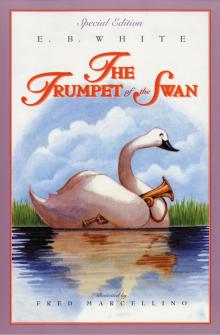- Home
- E. B. White
Essays of E. B. White Page 5
Essays of E. B. White Read online
Page 5
The rest of the afternoon, and the evening, was a strange nightmare of rising tempest and diminishing returns. The storm grew steadily in force, but in our neck of the woods a characteristic of hurricanes is that they arrive from the southwest, which is where most radio lives, and radio loses interest in Nature just as soon as Nature passes in front of the window and goes off toward the northeast. Weatherbee was right. The storm did strike here about six hours later, with winds up to ninety miles an hour, but when the barometer reached its lowest point and the wind shifted into the NW and began to tear everything to pieces, what we got on the radio was a man doing a whistling act and somebody playing the glockenspiel. All the livelong day we had had our mild weather to the sound of doom, and then at evening, when the power failed and the telephone failed and the tide flooded and the gale exploded, we heard the glockenspiel. Governor Cross, a Republican, who also lives to the westward, had already announced that the worst of the storm was over and that, except for a few benighted areas along the coast, everything was hunky-dory. I notice he got voted out of office a couple of days later, probably by an enormous outpouring of Republican turncoats from the coastal towns to the east of him, whose trees were being uprooted at the time he was speaking.
My own evening was an odd one. As Edna moved toward me across the Gulf of Maine, I watched the trees and the rain with increasing interest, albeit with no radio support except from the glockenspiel. At half past six, I evacuated my wife from a front room, without police action, and mixed us both a drink in a back room. At 6:55, she leaned forward in her chair and began neatening the books in a low bookshelf, pulling the volumes forward one by one and lining them up with the leading edge of the shelf, soldiers being dressed by their sergeant. By half past seven the wind had slacked off to give Edna’s eye a good peep at us, the glass was steadying, and ten minutes later, watching the vane on the barn, I saw the wind starting to back into the north, fitfully. The rain eased up and we let the dachshund out, taking advantage of the lull. (Unlike the geese, she had no use for rough weather, and she had obeyed the radio faithfully all day—stayed put under the stove.)
At 7:45, the Governor of New Hampshire thanked everyone for his cooperation, and Logan International Airport announced the resumption of flights. At eight o’clock, my barometer reached bottom—28.65. The Governor of Massachusetts came on to thank his people, and somebody announced that the Supreme Market in Dorchester would be open for business in the morning (Sunday). Another voice promised that at eleven o’clock there would be a wrap-up on Hurricane Edna.
At this point, I decided to take a stroll. The night was agreeable—moon showing through gray clouds, light rain, hurricane still to come. My stroll turned out to be a strange one. I started for the shore, thinking I’d look over things down there, but when I got to the plank bridge over the brook I found the bridge under water. This caused me to wonder whether my spring, which supplies the house and which is located in the low-lying woods across the road, was being unindated. So, instead of proceeding to the shore, I crossed the road and entered the woods. I had rubber boots on and was carrying a flashlight. The path to the spring is pretty well grown over and I had difficulty finding it. In fact, I’m not sure that I ever did find it. I waded about in the swampy woods for ten or fifteen minutes, most of the time in water halfway up to my knees. It was pleasant in there, but I was annoyed that I was unable to find the spring. Failing in this, I returned to the house, kicked off my boots, and sank back into radioland. The Bangor station predicted ninety-mile winds within half an hour, and I discovered a scrap of paper on which my wife had scribbled “Bangor 9437, 7173, and 2313”—emergency numbers taken down just as though we were really in telephone communication with the outside world. (The phone had been gone for a long time.)
At 8:44, the power failed, the house went dark, and it was a whole lot easier to see Edna. In almost no time the storm grew to its greatest height: the wind (NW by this time) chased black clouds across the ailing moon. The woods to the south of us bent low, as though the trees prayed for salvation. Several went over. The house tuned up, roaring with the thunder of a westerly wind. For a little while, we were both battened down and battered down.
There are always two stages of any disturbance in the country—the stage when the lights and the phone are still going, the stage when these are lost. We were in the second stage. In front of the house, a large branch of the biggest balm-of-Gilead tree snapped and crashed down across the driveway, closing it off. On the north side, an apple tree split clean up the middle. And for half an hour or so Edna held us in her full embrace.
It did not seem long. Compared to the endless hours of the radio vigil, it seemed like nothing at all. By ten o’clock, the wind was moderating. We lighted the dog up to her bed by holding a flashlight along the stairs, so she could see where to leap. When we looked out of a north bedroom, there in the beautiful sky was a rainbow lit by the moon.
It was Taylor Grant, earlier in the evening, who pretty well summed things up for radio. “The weather bureau estimates that almost forty-six million persons along the east coast have felt some degree of concern over the movement of the storm,” said Mr. Grant. “Never before has a hurricane had that large an audience.” As one member of this vast audience, I myself felt a twinge of belated concern the next morning when I went over to the spring to fetch a pail of water. There in the woods, its great trunk square across the path, its roots in the air, lay a big hackmatack.
I never did get to hear the wrap-up.
Coon Tree
ALLEN COVE, JUNE 14, 1956
The temperature this morning, here in the East, is 68 degrees. The relative humidity is 64 percent. Barometer 30.02, rising. Carol Reed is nowhere in sight. A light easterly breeze ruffles the water of the cove, where a seine boat lies at anchor, her dories strung out behind like ducklings. Apple blossoms are showing, two weeks behind schedule, and the bees are at work—all six of them. (A bee is almost as rare a sight these days as a team of horses.) The goldfinch is on the dandelion, the goose is on the pond, the black fly is on the trout brook, the Northeast Airliner is on course for Rockland. As I write these notes, the raccoon is nursing one of her hangovers on the branch outside the hole where her kittens are.
My doctor has ordered me to put my head in traction for ten minutes twice a day. (Nobody can figure out what to do with my head, so now they are going to give it a good pull, like an exasperated mechanic who hauls off and gives his problem a smart jolt with the hammer.) I have rigged a delightful traction center in the barn, using a canvas halter, a length of clothesline, two galvanized pulleys, a twelve-pound boat anchor, a milking stool, and a barn swallow. I set everything up so I could work the swallow into the deal, because I knew he would enjoy it, and he does. While his bride sits on the eggs and I sit on the milking stool, he sits on a harness peg a few feet away, giggling at me throughout the ten-minute period and giving his mate a play-by-play account of man’s fantastic battle with himself, which in my case must look like suicide by hanging.
I think this is the fourth spring the coon has occupied the big tree in front of the house, but I have lost count, so smoothly do the years run together. She is like a member of our family. She has her kittens in a hole in the tree about thirty-five feet above the ground, which places her bedchamber a few feet from my bedchamber but at a slightly greater elevation. It strikes me as odd (and quite satisfactory) that I should go to sleep every night so close to a litter of raccoons. The mother’s comings and goings are as much a part of my life at this season of the year as my morning shave and my evening drink. Being a coon, she is, of course, a creature of the night; I am essentially a creature of the day, so we Cox and Box it very nicely. I have become so attuned to her habits—her departure as the light fades at quarter past eight, her return to the hungry kittens at about 3 A.M., just before daylight, after the night’s adventures—that I have taken to waking at three to watch her home-coming and admire her faint silhouette against the sky as she ca
refully sniffs the bark all around the hole to learn if anything has been along during her absence and if any child of hers has disobeyed the instructions about not venturing out of the hole.
My introduction to raccoons came when, as a child, I read in a book by the late Dr. William J. Long a chapter called “A Little Brother to the Bear.” I read all the books of William J. Long with a passionate interest, and learned the Milicete Indian names for the animals. (Dr. Long always called a bear Mooween; he always called a chickadee Ch’geegee-lokh-sis. This device stimulated me greatly, but if I remember right, it annoyed Theodore Roosevelt, who was also interested in nature.) I must have read the raccoon story twenty times. In those days, my imagination was immensely stirred by the thought of wildlife, of which I knew absolutely nothing but for which I felt a kind of awe. Today, after a good many years of tame life, I find myself in the incredibly rich situation of living in a steam-heated, electrically lit dwelling on a tarred highway with a raccoon dozing in her penthouse while my power lawn mower circles and growls noisily below. At last I am in a position to roll out the green carpet for a little sister to the bear. (I have even encountered Dr. Long’s daughter Lois in my travels, but it was not among raccoons that we met, and she seemed to have no mark of the Milicete Indian about her whatsoever, and never in my presence has she referred to a great horned owl as Kookooskoos, which saddens me.)
There are two sides to a raccoon—the arboreal and the terrestrial. When a female coon is in the tree, caring for young, she is one thing. When she descends and steps off onto solid earth to prowl and hunt, she is quite another. In the tree she seems dainty and charming; the circles under her eyes make her look slightly dissipated and deserving of sympathy. The moment she hits the ground, all this changes; she seems predatory, sinister, and as close to evil as anything in Nature (which contains no evil) can be. If I were an Indian, naming animals, I would call the raccoon He Who Has the Perpetual Hangover. This morning, conditions inside the hole are probably unbearable. The kittens are quite big now, the sun is hot, and the hole is none too roomy anyway—it’s nothing but a flicker hole that time has enlarged. So she has emerged, to lie in full view on the horizontal limb just under her doorway. Three of her four legs are draped lifelessly over the limb, the fourth being held in reserve to hang on with. Her coat is rough, after the night of hunting. In this state she presents a picture of utter exhaustion and misery, unaccompanied by remorse. On the rare occasions when I have done a little hunting myself at night, we sleep it off together, she on her pallet, I on mine, and I take comfort in her nearness and in our common suffering.
I guess I have watched my coon descend the tree a hundred times; even so, I never miss a performance if I can help it. It has a ritualistic quality, and I know every motion, as a ballet enthusiast knows every motion of his favorite dance. The secret of its enchantment is the way it employs the failing light, so that when the descent begins, the performer is clearly visible and is a part of day, and when, ten or fifteen minutes later, the descent is complete and the coon removes the last paw from the tree and takes the first step away, groundborne, she is almost indecipherable and is a part of the shadows and the night. The going down of the sun and the going down of the coon are interrelated phenomena: a man is lucky indeed who lives where sunset and coonset are visible from the same window.
The descent is prefaced by a thorough scrub-up. The coon sits on her high perch, undisturbed by motorcars passing on the road below, and gives herself a complete going over. This is catlike in its movements. She works at the tail until it is well bushed out and all six rings show to advantage. She washes leg and foot and claw, sometimes grabbing a hind paw with a front paw and pulling it closer. She washes her face the way a cat does, and she rinses and sterilizes her nipples. The whole operation takes five to fifteen minutes, according to how hungry she is and according to the strength of the light, the state of the world below the tree, and the mood and age of the kittens within the hole. If the kittens are young and quiet, and the world is young and still, she finishes her bath without delay and begins her downward journey. If the kittens are restless, she may return and give them another feeding. If they are well grown and anxious to escape (as they are at this point in June), she hangs around in an agony of indecision. When a small head appears in the opening, she seizes it in her jaws and rams it back inside. Finally, like a mother with no baby-sitter and a firm date at the theater, she takes her leave, regretfully, hesitantly. Sometimes, after she has made it halfway down the tree, if she hears a stirring in the nursery she hustles back up to have another look around.
A coon comes down a tree headfirst for most of the way. When she gets within about six feet of the ground, she reverses herself, allowing her hind end to swing slowly downward. She then finishes the descent tailfirst; when, at last, she comes to earth, it is a hind foot that touches down. It touches down as cautiously as though this were the first contact ever made by a mammal with the flat world. The coon doesn’t just let go of the tree and drop to the ground, as a monkey or a boy might. She steps off onto my lawn as though in slow motion—first one hind paw, then the other hind paw, then a second’s delay when she stands erect, her two front paws still in place, as though the tree were her partner in the dance. Finally, she goes down on all fours and strides slowly off, her slender front paws reaching ahead of her to the limit, like the hands of an experienced swimmer.
I have often wondered why the coon reverses herself, starting headfirst, ending tailfirst. I believe it is because although it comes naturally to her to descend headfirst, she doesn’t want to arrive on the ground in that posture, lest an enemy appear suddenly and catch her at a disadvantage. As it is, she can dodge back up without unwinding herself if a dog or a man should appear.
Because she is a lover of sweet corn, the economic status of my raccoon is precarious. I could shoot her dead with a .22 any time I cared to. She will take my corn in season, and for every ear she eats she will ruin five others, testing them for flavor and ripeness. But in the country a man has to weigh everything against everything else, balance his pleasures and indulgences one against another. I find that I can’t shoot this coon, and I continue to plant corn—some for her, what’s left for me and mine—surrounding the patch with all sorts of coon baffles. It is an arrangement that works out well enough. I am sure of one thing: I like the taste of corn, but I like the nearness of coon even better, and I cannot recall ever getting the satisfaction from eating an ear of corn that I get from watching a raccoon come down a tree just at the edge of dark.
Today I’ve been rereading a cheerful forecast for the coming century, prepared by some farsighted professors at the California Institute of Technology, and published not long ago in the Times. Man, it would appear, is standing at the gateway to a new era of civilization. Technology will be king. Everything man needs (the report says) is at hand. All we require is air, sea water, ordinary rock, and sunlight. The population of the earth will increase and multiply, but that’ll be no problem—the granite of the earth’s crust contains enough uranium and thorium to supply an abundance of power for everybody. If we just pound rock, we’re sitting pretty.
It is a splendid vision: technology the king, Jayne Mansfield the queen. (It is also the same old conflict.) Right in the middle of the forecast, the professors paused long enough to let drop a footnote. Their prediction, they said, applies only if world catastrophe is avoided. At any rate, the civilization at whose gateway I am said to be standing will pose one rather acute problem for me: What position am I going to take in the matter of rock? I have taken my stand on raccoon; now I have to take my stand on rock. These acres on which I live are well supplied and underlaid with rock. The pasture is full of granite, the vegetable garden has some splendid rocks in it, the foundation of the house is granite, the doorstone is granite, there is a granite outcropping in the lawn where the whippoorwill comes to sit and repeat himself in the hour before daybreak, several of the fields are ledgy in places, and if you wander into th
e woods, you come on old stone walls made of tons and tons of rock. A ton of granite, according to my advices, contains about four grams of uranium and twelve grams of thorium. Is my next move to extract this stuff, or can I leave my stones be? I assume that if I am to dwell contentedly and adjust to the new era, I must pick the uranium and thorium from my rocks and convert them into power, but I’m not sure I am ready to fall in with any such harebrained scheme. The only time I ever fooled with rocks in a big way on this place, I simply made a lot of noise, created a memorable era of confusion, and ended up about where I started. (I got fooling with rocks because I had bought a cow, and in the country one thing leads to another.) The only place for a nuclear reactor here would be the brooder house, and I need the brooder house for my chicks. If the modern way to get electric power to run my brooder stove is to tap the energy in my pasture rocks, I may very well consider returning to the old natural method of raising chicks, using a couple of broody hens—in which case I am standing at the gateway to the long past rather than the long future. There is one big boulder down in the pasture woods where I sometimes go to sit when I am lonely or sick or melancholy or disenchanted or frightened, and in combination with sweet fern, juniper, and bayberry this old rock has a remarkably restorative effect on me. I’m not sure but that this is the true energy, the real source of man’s strength. I’m not sure rocks would work out so well for me if I were to drag them up out of the pasture and pry the fissionable materials out of them.
I am not convinced that atomic energy, which is currently said to be man’s best hope for a better life, is his best hope at all, or even a good bet. I am not sure energy is his basic problem, although the weight of opinion is against me. I would feel more optimistic about a bright future for man if he spent less time proving that he can outwit Nature and more time tasting her sweetness and respecting her seniority. Almost every bulletin I receive from my county agent is full of wild schemes for boxing Nature’s ears and throwing dust in her eyes, and the last issue of the Rural New-Yorker contained a tiny item saying that poultrymen had “volunteered” to quit feeding diphenyl-para-phenylene-diamine to chickens, because it can cause illness in “persons”—one of the tardiest pieces of volunteer activity I ever heard of. Yesterday, it was reported in the news that atomic radiation is cumulative and that no matter how small the dose, it harms the person receiving it and all his descendants. Thus, a lifetime of dental X-rays and other familiar bombardments and fallouts may finally spell not better teeth and better medicine but no teeth and no medicine and a chicken dinner may become just another word for bellyache. The raccoon, for all her limitations, seems to me better adjusted to life on earth than men are: she has never taken a tranquilizing pill, has never been X-rayed to see whether she is going to have twins, has never added DPPD to the broiler mash, and is not out at night looking for thorium in rocks. She is out looking for frogs in the pond.

 Charlotte's Web
Charlotte's Web Stuart Little
Stuart Little The Elements of Style
The Elements of Style Here Is New York
Here Is New York The Trumpet of the Swan
The Trumpet of the Swan Essays of E. B. White
Essays of E. B. White Writings from the New Yorker 1925-1976
Writings from the New Yorker 1925-1976 Letters of E. B. White
Letters of E. B. White